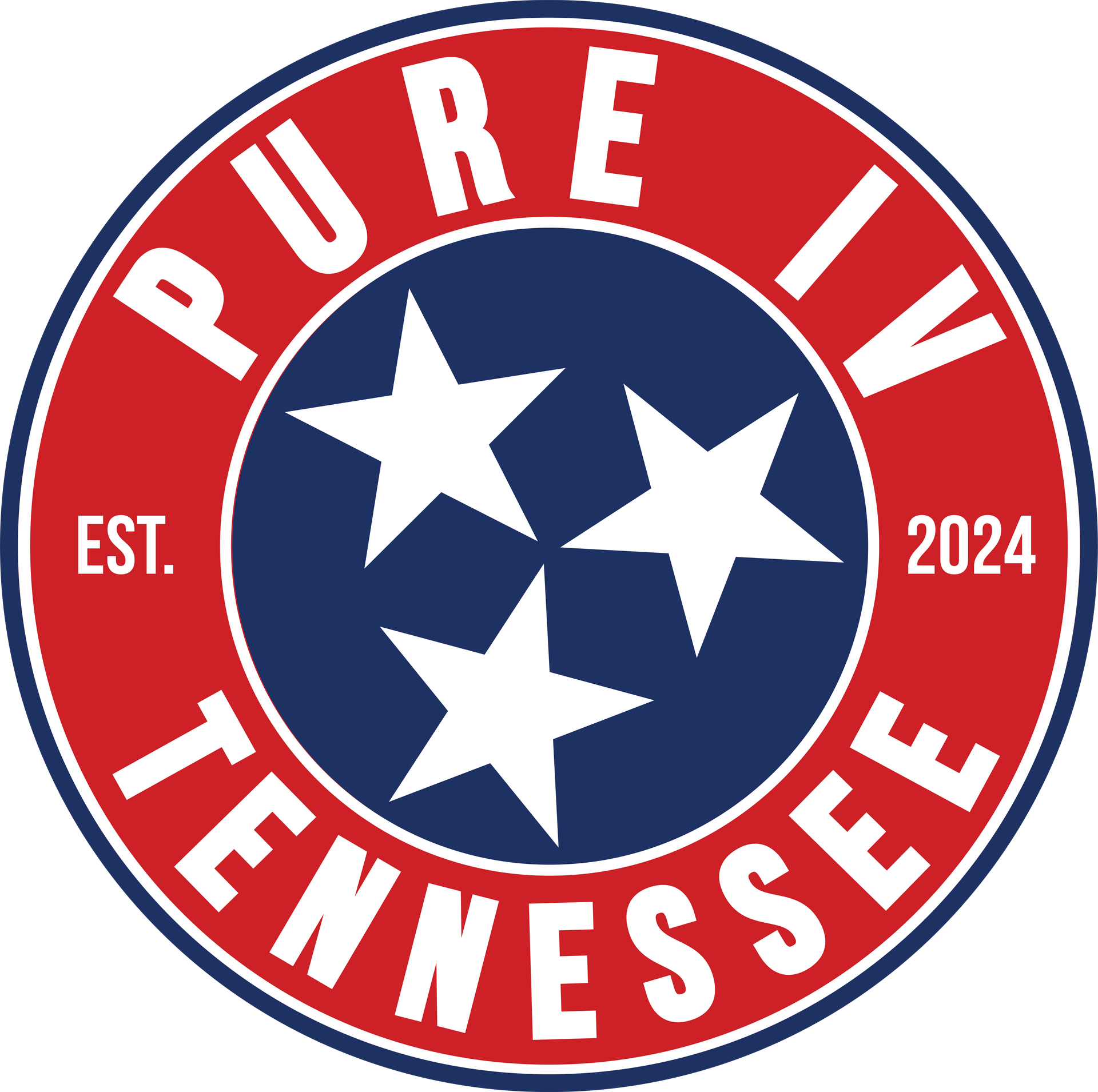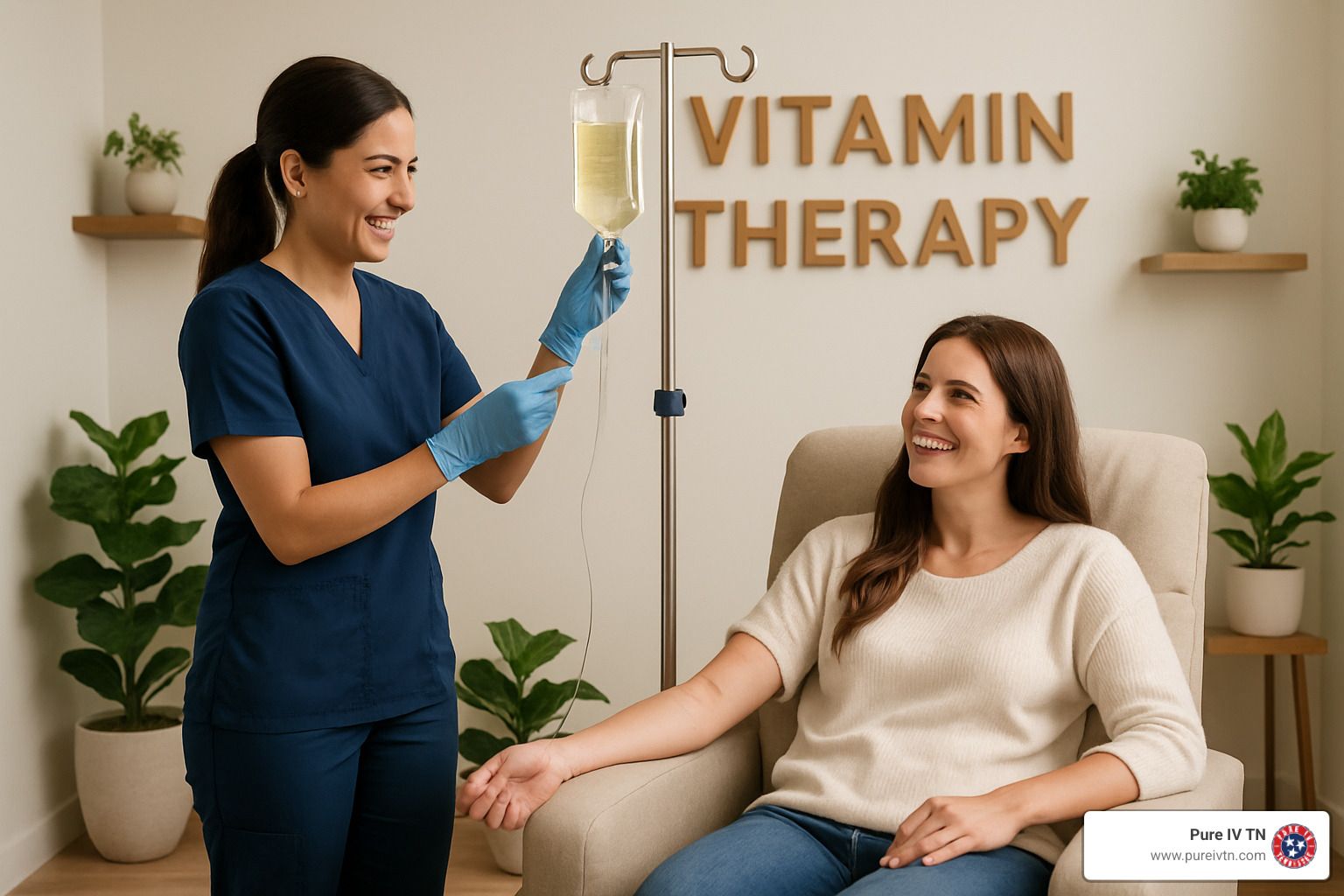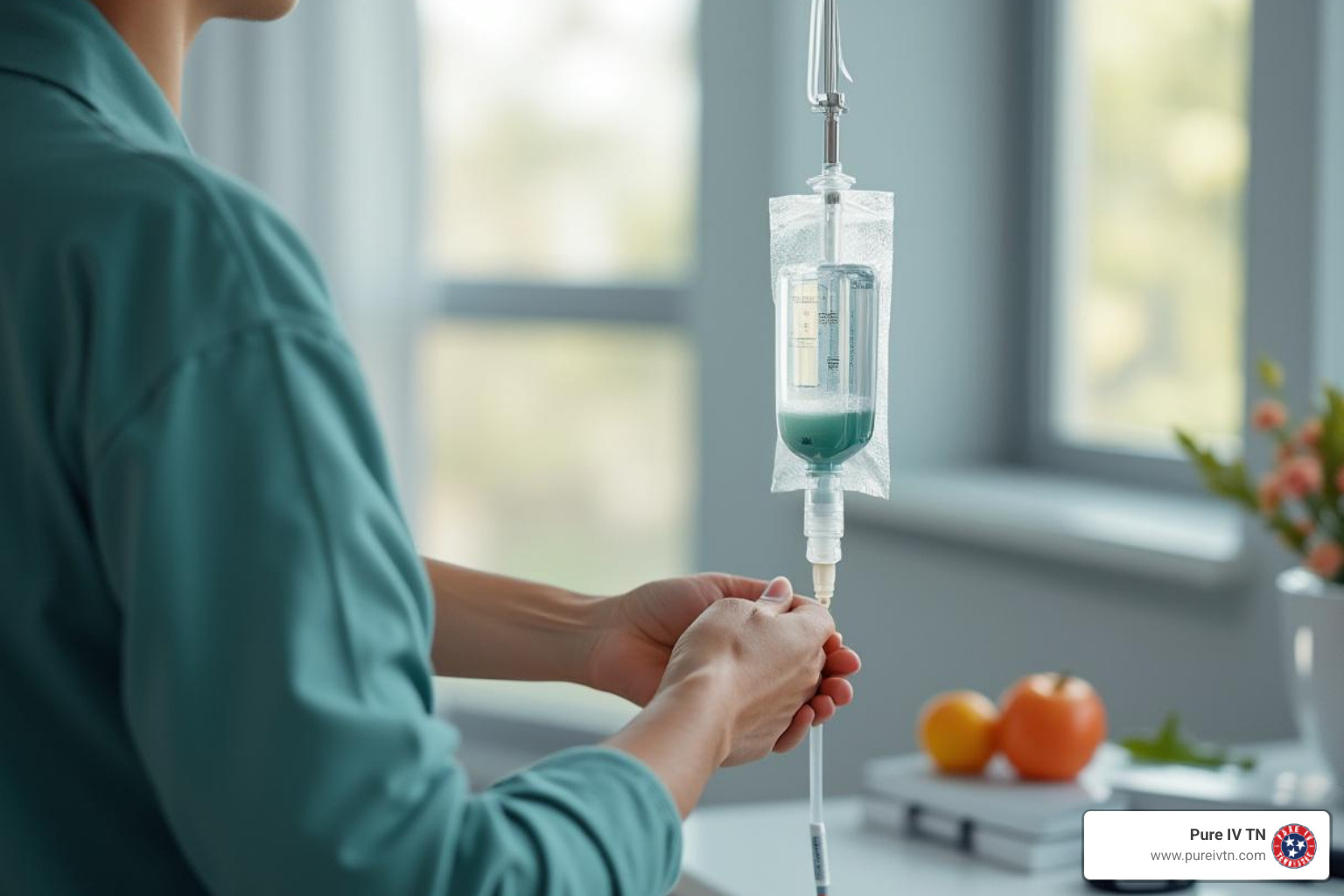Is IV Therapy Safe for Everyone? Risks, Benefits, and Precautions
IV therapy is a method of delivering fluids, vitamins, and nutrients directly into your bloodstream through IV lines. As it doesn’t go through the digestive system, nutrients are absorbed faster and more completely than from food or supplements.
But is IV therapy safe? YES, IV therapy is generally safe—especially when administered by a licensed healthcare team. Safety depends on your health, the type of treatment, and whether proper administration procedures are followed.
People choose intravenous fluids for many reasons. Some turn to it for quick hydration after illness, pain relief, exercise, or travel. Others use it to boost energy, as an immune system booster, correct electrolyte imbalances, or recover from nutrient deficiencies.
It’s important to note the difference between medical IV therapy and wellness-focused drips:
- Medication Infusion–Done in hospitals or clinics, used to treat conditions like dehydration, infections, or nutrient deficiencies, always under strict medical supervision.
- Wellness IV therapy–Offered in specialized clinics, aimed at boosting energy, hydration, immunity, or overall well-being rather than treating medical conditions.
Understanding the benefits is the first step in answering the question, Is IV therapy safe for you.
General Benefits of IV Infusion Therapy
IV hydration provides several key benefits when delivered under professional supervision:
- Faster hydration and electrolyte balance–IV fluids and electrolytes enter the bloodstream directly, skipping digestion. This makes rehydration much quicker and more effective, especially for dehydration from illness, heat, or heavy workouts.
- Better nutrient absorption–Pills and food must go through digestion, which can limit absorption. IV Vitamin therapy ensures your body gets the full intended dose of vitamins and minerals without losses along the way.
- Immune support–Vitamin infusions such as high-dose vitamin C or Myers' cocktail IV strengthen immunity, fight infections, and reduce inflammation.
- Energy boost–B vitamins and amino acids fuel your body’s energy systems. These blends can improve focus, reduce fatigue, and restore mental clarity, making them popular with busy professionals and travelers.
- Recovery support–Intravenous infusions help your body bounce back after illness, surgery, strenuous exercise, or even jet lag. It restores lost fluids, aids muscle repair, and replenishes nutrient reserves to speed up recovery.
- Detoxification–Antioxidants like glutathione and vitamin C support the liver in removing toxins. This helps reduce oxidative stress and promotes clearer skin, improved energy, and overall wellness.
- Athletic performance and recovery–Athletes use IV hydration to stay hydrated, replace electrolytes, and reduce recovery time. Tailored blends can improve endurance and support muscle function.
- Symptom relief–IV infusion therapy is sometimes used to ease hangovers, migraines, jet lag, or flu-like symptoms. The quick delivery of fluids and nutrients often provides fast relief and comfort.
Who Can Safely Receive IV Therapy?
Most healthy adults can safely benefit from IV hydration services when provided by licensed professionals. IV infusion therapy is commonly used by:
- People with dehydration–from illness, travel, heat exhaustion, or exercise.
- Athletes–to restore electrolytes and speed up recovery.
- Seniors–who may require senior IV therapy for hydration, vitamin D deficiencies, and to manage age-related diseases.
- Professionals under stress–to reduce fatigue and improve focus.
- Frequent travelers–to fight jet lag and boost immunity.
- Patients with certain deficiencies–such as vitamin D deficiencies, low vitamin B12, iron, or magnesium.
However, some individuals require extra caution. A thorough medical evaluation is necessary for:
- Pregnant or breastfeeding women–Nutrient and fluid needs are different during pregnancy and nursing. Some IV fluids may not be safe for the baby.
- People with heart conditions–Extra fluids can put strain on the heart and worsen symptoms.
- Those with kidney problems–Kidneys may struggle to filter excess IV fluids and electrolytes, increasing the risk of complications.
- Patients taking certain medications–Drugs like diuretics, blood pressure medicines, or steroids may interact with IV formulas.
- Anyone with past allergic reactions–If you’ve had reactions to vitamins, medications, or IV fluids, special caution is needed.
- Children–Kids have different fluid and nutrient requirements, and IV infusion therapy should only be done under pediatric medical supervision.
In these cases, medical clearance helps ensure the treatment is tailored safely to your needs. A licensed provider will also adjust formulas to prevent overload or harmful interactions.
Risk and Potential Side Effects
While generally safe when performed by licensed professionals, IV infusion therapy does carry potential risks and side effects. Most side effects are minor, but more serious complications can occur if treatments are not handled properly.
- IV site or insertion site issues–Mild pain, bruising, or swelling is common where the IV needle is inserted. These usually go away after the treatment ends.
- Infection risk–Poor hygiene around the insertion site can allow bacteria into the bloodstream.
- Vein irritation or inflammation–Also called phlebitis, this can cause redness, warmth, or tenderness along the vein. It may require rest or medical treatment if severe.
- Allergic reactions–Some people may react to vitamins, minerals, or additives in the drip. Reactions range from mild rashes or itching to, in rare cases, serious allergic responses.
- Fluid overload–Receiving IV fluids too quickly or in large amounts can put pressure on the heart, lungs, or kidneys. People with underlying conditions are more at risk.
- Electrolyte imbalance–If the drip contains incorrect amounts of sodium chloride, potassium, or other minerals, it can make symptoms worse rather than better.
This is why patient safety depends on trained providers and a professional healthcare team.
Precautions to Take Before IV Infusion Therapy

If you’re considering IV infusion therapy, it’s important to take the right steps for safety and effectiveness:
- Choose licensed providers–Only seek treatment from clinics with trained, certified professionals. This lowers the risk of complications and ensures you receive the correct formulas for your needs.
- Share your medical history–Always tell your provider about existing health conditions, allergies, and medications. This helps avoid dangerous interactions or formulas that could worsen your condition.
- Ask about customized drips–Not all drips are suitable for everyone. A provider should tailor their treatment to match your goals, whether it is hydration therapy, vitamin treatment, or any other nutrition infusions.
- Confirm sterile practices–Infections can occur if equipment isn’t sterile. Make sure the clinic uses sealed fluid bags, single-use needles and IV catheters, and follows strict hygiene protocols.
- Stay hydrated before treatment–Drinking water beforehand helps your veins dilate, making IV placement easier and more comfortable.
- Eat a light, balanced meal–Having some food in your stomach reduces the chances of dizziness, nausea, or lightheadedness during the infusion.
- Consider lab testing–If you have chronic conditions or recurring fatigue, bloodwork to determine which vitamin infusions or nutritional infusions you truly need.
- Understand realistic outcomes–IV infusion therapy can boost hydration and wellness, but it is not a replacement for healthy lifestyle choices or medical treatment.
For most healthy adults, IV infusion therapy offers benefits when used responsibly and in moderation. But for people with certain health conditions, the risks may outweigh the rewards.
For peace of mind, always choose trusted providers. At Pure IV Tennessee, treatments are administered by licensed professionals who follow strict safety standards, ensuring you get the benefits of IV therapy.













